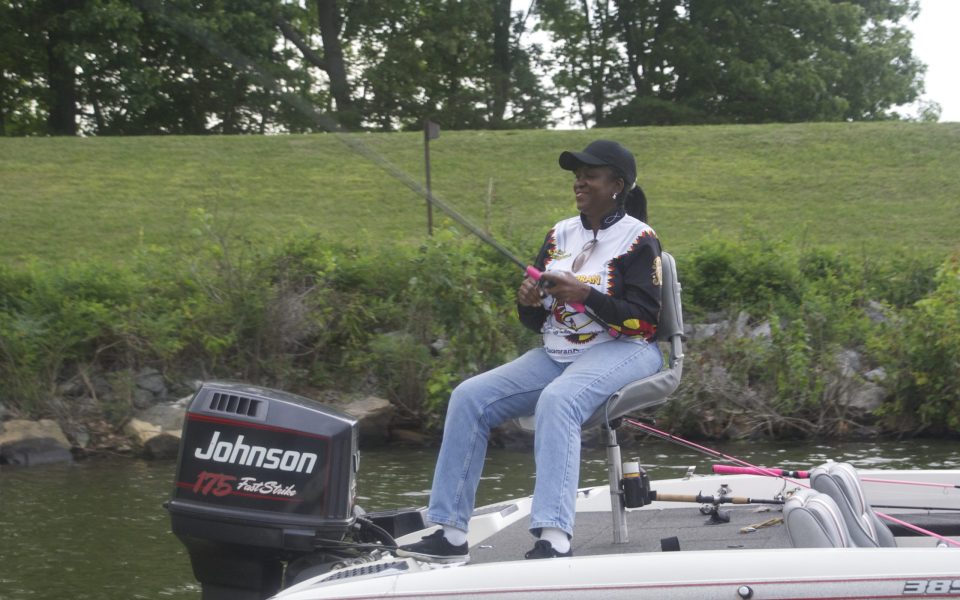Sabrina Thompson, the first African-American woman to fish the Bassmaster Opens, came to Greensboro to participate in a pro-am bass tournament at Lake Higgins on June 12. I had the good fortune to meet and interview her.
Triad City Beat: You’ve never been to Lake Higgins. Did you enjoy it?
Sabrina Thompson: I did enjoy the lake very much. It was a little difficult to exercise my normal routine, because I didn’t have my own boat or equipment. The city of Greensboro set it up so that I would be a co-angler. Although [my co-angler, Todd] Wilson was so very friendly and gracious, and I am very grateful to him for having me on his boat; it just was not the same as being in control of my own boat!
TCB: What’s your favorite tackle setup to use?
ST: I honestly enjoy using a Texas rig on medium-heavy, fast-action rod using a baitcaster. My favorites are soft baits, mostly creature type softbaits, although I do enjoy using spinnerbaits and crankbaits when the time calls for those types of lures.
TCB: How long have you been fishing, and how did you get into it?
ST: I’ve been fishing for over 30 years. I started fishing because my children wanted to go fishing with their dad. My first husband said that if they wanted to learn I had to learn with them so that I could be the one to watch them. But I was so afraid of everything. Worms, bugs, fish… everything. My first fishing experience was very scary, but I overcame my fears and found that I really enjoyed it.
TCB: Bass fishing still is something of a boys’ club. When did you begin fishing professionally?
ST: I started my professional career in 2007. I fished the Woman’s Bassmasters Tour until Bassmasters cancelled the program in 2010. In February 2011, I became the first African-American woman to fish the Bassmasters Central Open in Lewisville, Texas.
Fishing with an all-women’s tour and then fishing on a man’s tour is like night and day. I found that women are more welcoming and more accepting of me than the men were. You don’t see many African-American women fishing on a professional level, although there are quite a few of us out there.
TCB: How does it feel to be an African-American woman entering the sport?
ST: For some this was a cultural shock, seeing me fishing on a professional level. Most assume that African Americans are afraid of the water, that we don’t swim and we don’t get into or own boats — I had someone say this to me once. I found it to be quite funny because we, as a culture, do all of these things.
It’s a daily struggle trying to maintain on the professional tours. Most have sponsors that help them continue to fish the tours. But being African American and a woman, it’s like pulling teeth to get a sponsorship from any of the major product companies. They are under the assumption that I’m only marketable to other African Americans, which is not the case. I have all cultures reaching out to me as an angler. I have one sponsor that truly believes in me as a professional angler, Tuscaroran Lures; they have been my major sponsor for years.
I have reached out to the some of the same companies that I purchase product from, including my boat dealership — we’ve purchased two boats from Triton — and the only thing they want to do is send me a couple of T-shirts with their name on it and say thanks. I was even told that they didn’t do sponsorships, only to see this company’s logo all over other male boaters when I’m fishing the major circuits.
This is a big problem with a lot of the African-American professional anglers. The industry needs to see we are an untapped demographic and they could do a lot better with minority dollars if they just step into the 21st Century.
TCB: Do you do any outreach to young, women and/or minority anglers?
ST: I have been an advocate of getting women, children and minorities out fishing for years now. My husband and I host derbies all over the country with the purpose of introducing fishing to those who wouldn’t otherwise have anyone to take them out and show them how much fun it really is. We always leave them with fishing tackle so they can continue to enjoy it after we’re gone.
TCB: Any additional comments?
ST: I think it’s real important to get some of the mothers out fishing, because they will bring the kids out to enjoy the outdoors. The kids just think they are out there fishing and having fun when, in fact, they are learning to become future scientists.
When they learn about fish identifications and organisms in the water, this is the beginnings of a marine biologist. They study the weather to know how the fish are biting — meteorologists. They have to determine weight and growth patterns — mathematicians. If they like fly-fishing, they will learn to identify different bugs that hit the water that the fish like to eat — entomologists. They learn how important it is to keep the lakes and rivers cleans — conservationists.
So there’s much more to it than just fishing, and I want everyone to know it, love it and enjoy it as much as I do.
Join the First Amendment Society, a membership that goes directly to funding TCB‘s newsroom.
We believe that reporting can save the world.
The TCB First Amendment Society recognizes the vital role of a free, unfettered press with a bundling of local experiences designed to build community, and unique engagements with our newsroom that will help you understand, and shape, local journalism’s critical role in uplifting the people in our cities.
All revenue goes directly into the newsroom as reporters’ salaries and freelance commissions.



Leave a Reply